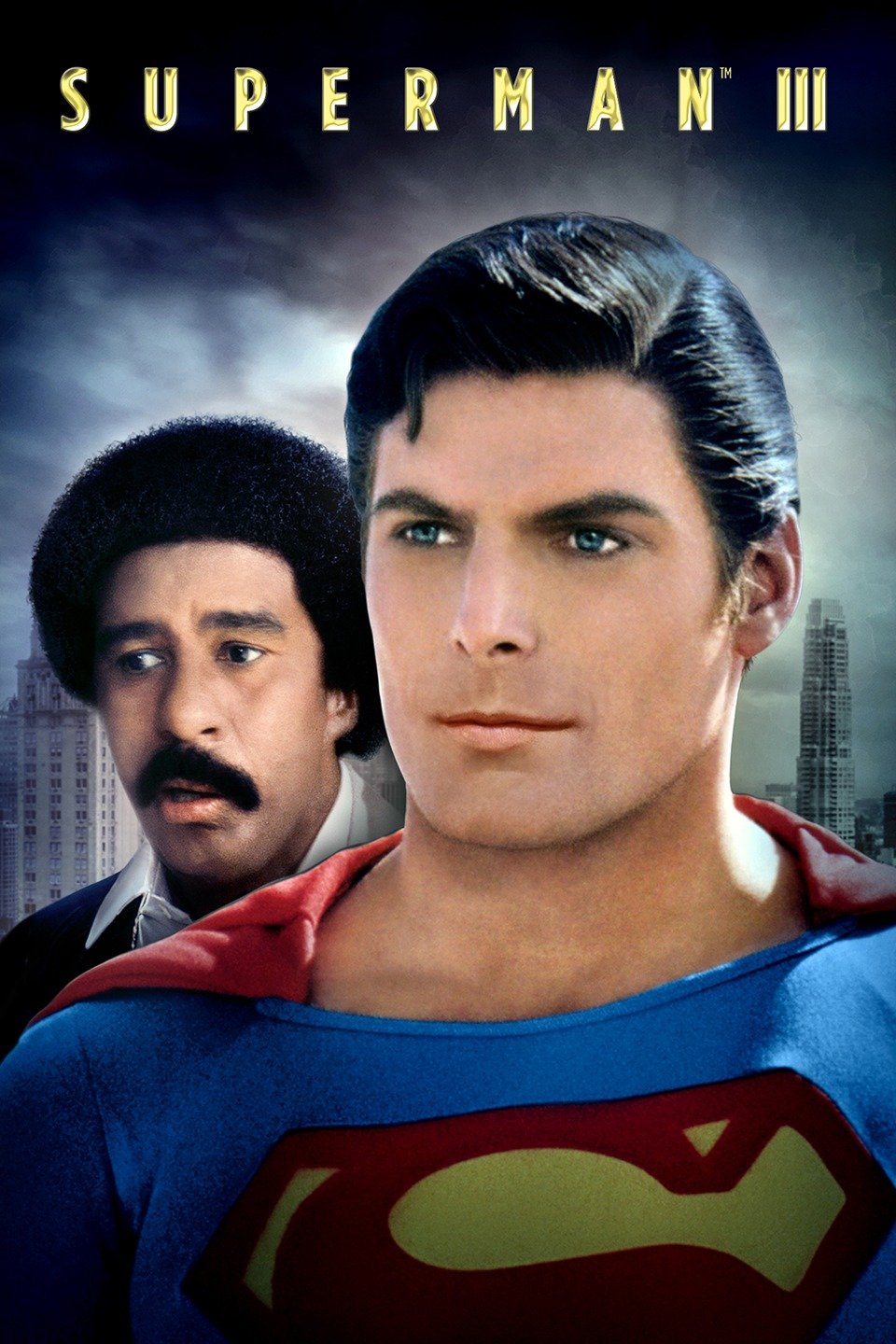Can a superhero truly be defeated? The 1983 film, "Superman III," dared to explore this very question, plunging the Man of Steel into a battle not just against supervillains, but against the very fabric of his own identity.
Directed by Richard Lester, from a screenplay by David Newman and Leslie Newman, "Superman III" marked the third installment in the cinematic saga of the iconic DC Comics character. Building upon the foundations laid by "Superman: The Movie" (1978) and "Superman II" (1980), the film saw Christopher Reeve reprise his role as the titular hero, once again embodying the strength, compassion, and unwavering moral compass that defined the character. However, this time, the challenges facing Superman were multifaceted, encompassing both external threats and internal struggles.
The plot of "Superman III" revolves around the machinations of wealthy executive Ross Webster, played with a cunning intensity by Robert Vaughn. Webster, determined to exploit Superman's vulnerabilities, enlists the aid of Gus Gorman, a bumbling but brilliant computer programmer portrayed by the comedic genius Richard Pryor. Gorman is tasked with a seemingly impossible assignment: to create synthetic kryptonite. This artificial version of Superman's only weakness presents a new and formidable threat. The synthetic kryptonite is not only designed to physically weaken Superman, but also has psychological effects, leading to a darker, more morally ambiguous version of the hero.
Beyond the central conflict, "Superman III" delves into Superman's personal life. The film features the rekindling of a romance with his high school sweetheart, played by Annette O'Toole. While navigating these complex relationships, Superman also confronts a powerful supercomputer, a technological marvel created by Gorman. The film's narrative is further enriched by the presence of other memorable characters, including Jackie Cooper as Perry White, Marc McClure as Jimmy Olsen, and Annie Ross as Webster's scheming accomplice.
The film's production faced some challenges. While the film brought in a good amount of money at the box office it received mixed reviews from critics. Some critics found the film's comedic tone and focus on the character of Gus Gorman detracted from the seriousness of the Superman narrative. Despite these criticisms, "Superman III" remains a significant entry in the Superman film series, exploring the themes of good versus evil, the dangers of unchecked ambition, and the importance of staying true to one's values. It is a pivotal part of the Superman legacy, particularly for its exploration of the character's inner demons.
The cast of "Superman III" included: Christopher Reeve as Superman, Richard Pryor as Gus Gorman, Jackie Cooper as Perry White, Marc McClure as Jimmy Olsen, Annette O'Toole as Lana Lang, Annie Ross as Vera Webster, Pamela Stephenson as Lorelei Ambrosia, and Robert Vaughn as Ross Webster.
The film explores themes of corporate greed, the misuse of technology, and the internal struggles of a hero. It also delves into Superman's personal life, his relationships, and the moral dilemmas he faces when confronted with an adversary who can exploit his weaknesses.
The film's impact extended beyond the screen. "Superman III" became a part of the cultural conversation surrounding the Superman mythos, sparking debates about the character's portrayal, the film's comedic elements, and its exploration of the hero's vulnerabilities. Furthermore, the film's exploration of synthetic kryptonite has influenced the way the Man of Steel is depicted in subsequent comics, animated series, and other media.
Christopher Reeve, who played Superman, was born on September 25, 1952, in New York City. His career spanned both film and stage, and he was known for his dedication to his craft and his commitment to portraying Superman with sincerity and depth.
The "Superman Curse" is a fascinating cultural phenomenon, a belief that a series of misfortunes plague those involved with the Superman franchise. This idea gained traction in the media, with George Reeves, the actor who portrayed Superman in the 1950s television series "The Adventures of Superman," being one of the earliest subjects of the curse.
The DC Universe is rich with a diverse array of characters, and the film pays homage to this heritage, presenting memorable figures in the form of several characters.
| Attribute | Details |
|---|---|
| Full Name | Christopher D'Olier Reeve |
| Date of Birth | September 25, 1952 |
| Place of Birth | New York City, New York, USA |
| Date of Death | October 10, 2004 |
| Cause of Death | Cardiac arrest |
| Nationality | American |
| Occupation | Actor, Director, Writer, Activist |
| Known For | Portraying Superman in the Superman film series |
| Notable Awards | BAFTA Award, Emmy Award, Grammy Award, Screen Actors Guild Award |
| Spouse | Dana Morosini (m. 19922004) |
| Children | 3 |
| Education | Cornell University |
| Website | https://www.christopherreeve.com/ |
The legacy of "Superman III" continues to resonate with fans and critics alike. The film's impact on the Superman mythos, its exploration of complex themes, and its memorable performances by the cast are a testament to its enduring appeal. The films exploration of the heros internal struggles and his confrontation with a supercomputer contribute to a dynamic and engaging plot.
The film features actors like Richard Pryor, who delivered a memorable performance. The film stands as a significant moment in cinematic history, and it continues to be a subject of discussion and analysis.
In addition to the film itself, the production also spurred the release of various tie-in products, including vinyl albums. These albums, released by Peter Pan Records during the 1970s and 1980s, allowed fans to further immerse themselves in the Superman universe, experiencing the stories and characters through audio narratives.
The film was produced by Alexander and Ilya Salkind, who had previously produced the first two Superman films. The film marked the last Superman film to be produced by Alexander Salkind and Ilya Salkind.
The legacy of the film goes beyond its initial theatrical run. Over the years, it has been made available through home video releases, including various special editions. However, in some instances, these releases faced challenges, such as the mislabeling of a DVD disc, which led to recalls.
The film's narrative also includes themes like corporate greed and technological threats.
The casting of characters in the "Superman" franchise, including the more recent recasting of Jonathan Kent in the "Superman and Lois" series, demonstrates the evolving nature of the character in contemporary media.
The film's exploration of the character's vulnerabilities, both physical and psychological, added depth to the character's portrayal.
The film's exploration of synthetic kryptonite, which had psychological effects on Superman. This added an interesting element to Supermans character.
In the 2006 film Hollywoodland, Ben Affleck went on to play George Reeves, who was the actor playing Superman. The film served as a reflection on the actor's life and career, and the impact that the Superman role had on him.
The "Superman" film series, beginning with the 1978 film starring Christopher Reeve, has left a significant mark on popular culture.
The 1978 "Superman" film, directed by Richard Donner, remains a foundational film in the superhero genre.


